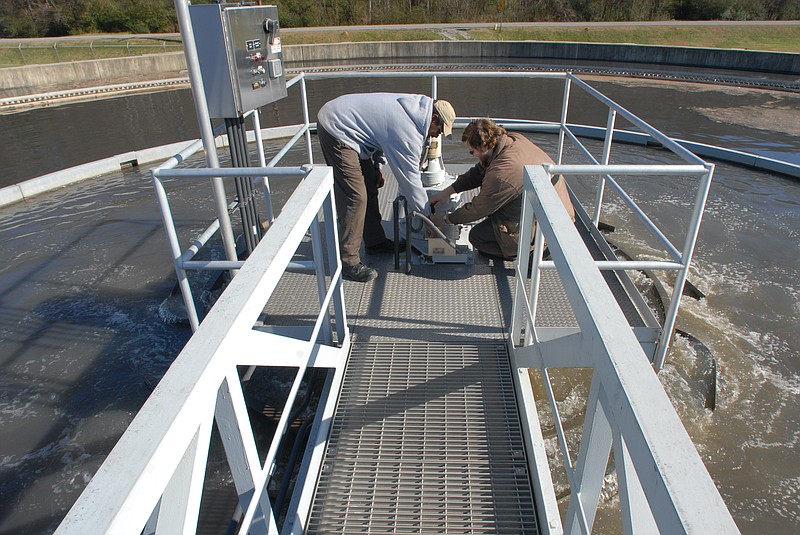Flushes are not free. Truthfully, getting rid of our waste hasn't been truly free since we eliminated outhouses from our landscapes. And no one wants to go back there.
But the tongues are wagging these days about Chattanooga and Hamilton County property owners, homeowners (and renters, too) expecting to see higher sewer bills next month to help pay for system upgrades to limit unsanitary overflows and other water pollution runoff - you know, that stinky stuff that runs in and under our streets and into local creeks, streams and the Tennessee River when we have an inch or more of rainfall.
Out in the county, some 32,000 residents served by the Hamilton County Wastewater Treatment Authority, known as the WWTA, will see their sewer fees rise 9.8% on Oct. 1. The typical $5.28 increase will bring most county household sewer bills to about $59 a month, following a 12% jump a year ago and a 9.8% rate bump in county sewer rates adopted in 2019.
Similarly, Chattanooga is planning a 6% rate increase for its 65,000 residential sewer users, officials announced in late August. That will mean another $3.24 a month, the first jump in two years, to raise the average city sewer bill to $57.19 a month.
Don't be fooled by some of our officials using weighted words like "federally mandated" and "penalties" to cast blame up the political food chain for these higher rates. It's true that the U.S. Clean Water Act and the U.S. Safe Drinking Water Act were enacted by Congress and signed by presidents, but these sewer rate increases are perfect examples of the saying: "all politics are local."
These rising fees are the result of local politicians kicking the can down the road decade and decade after decade instead of building adequate infrastructure all along the way, and putting aside petty city/county turf wars to do it. It's not about city or county, red or blue. It's about how much raw sewage we want flowing into the Tennessee River that is the source of drinking water for 5.1 million people.
With that in mind, the U.S. Environmental Protection Agency has been prodding both the WWTA and Chattanooga for years to come into compliance with our country's decades-old environmental laws.
The city in 2013 reached a consent agreement with EPA to clean up its messes at a cost of about $250 million. City officials say the "completion horizon" is still about 10 years out.
The WWTA has been "negotiating" for more than five years to develop a fix-it plan and join in "a consent decree" with EPA to get the county's sewer overflow under control. In 2019, that "fix" was estimated at about $248 million.
These costs do not represent fines or penalties. Rather they are for repairs and additional needed infrastructure.
Both the city and WWTA stalled until EPA would allow them to stall no longer. In WWTA's case, part of the stall was slowly progressing repairs and an ill-conceived proposal to build a north county wastewater treatment plant. (The plant proposal sunk when the county commission gave it a no-vote, and rightfully so, as the less expensive and least land-consuming plan would be to construct more pipes and pumps to move the county waste to the not-at-capacity Moccasin Bend Wastewater Treatment Plant.)
In the meantime, more and more people build new houses all over the county and city, even as sewer moratoriums continue to limit new developments in parts of Soddy-Daisy, Signal Mountain, Red Bank, East Ridge and other areas of the county outside of the city of Chattanooga.
That brings us back to the question of turf wars and "all politics are local." Only kingmakers need apply here, and he who controls water - even wastewater - controls growth: Where it can happen, and where it can't.
On the heels of that bitter county fight and the commission's no-vote over WWTA's plan to build a tiny $45 million sewage treatment plant in the affluent community in Ooltewah, County Mayor Jim Coppinger called one of the leaders of the Ooltewah plant's opposition, Dean Moorhouse, and asked him to head up a search committee for a new treatment plant site.
But the panel's well-researched work further upset the county apple cart by finding - wisely - that the best site isn't in the county's WWTA jurisdiction. It's our existing regional Moccasin Bend plant that belongs to the city of Chattanooga. They also found that this option would be $6.3 million a year cheaper than building another sewage treatment plant.
After that bombshell, commissioners approved a resolution authorizing discussions between the county and city over possible consolidation of wastewater treatment.
Anyone who knows anything about Chattanooga and Hamilton County knows the five-syllable c-word is an instant turf war battle cry. So the county's resolution marked a red-letter day. Had we realized county stuff and city stuff smell the same?
But then, of course, the pandemic came. And a city election. And a new commissioner or two. But no one should give up hope. The new city mayor, Tim Kelly, campaigned on the idea of building efficiencies.
It's a hopeful idea.
The fix really is as simple as Moorhouse's group suggested: Extend the necessary infrastructure to carry sewage to Moccasin Bend - the 140 million-gallon-per-day regional sewage treatment plant that can treat twice the waste it handles right now, even as it already treats waste from all of Chattanooga, Red Bank, portions of unincorporated Hamilton County, Soddy-Daisy, East Ridge, Collegedale and Lookout Mountain (Tennessee and Georgia), Rossville, Walker County, parts of Wildwood, Fort Oglethorpe and Ringgold.
It takes money - your money - and it takes overcoming some vastly oversized egos.
